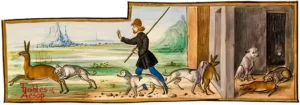A Hound berated a House Dog for getting a large share of the kill on the Master’s return. The House Dog replied it was not his fault; talk to the Master.
Children are not to be blamed for the faults of their parents.

Townsend version
A man had two dogs: a Hound, trained to assist him in his sports, and a Housedog, taught to watch the house. When he returned home after a good day’s sport, he always gave the Housedog a large share of his spoil. The Hound, feeling much aggrieved at this, reproached his companion, saying, “It is very hard to have all this labor, while you, who do not assist in the chase, luxuriate on the fruits of my exertions.” The Housedog replied, “Do not blame me, my friend, but find fault with the master, who has not taught me to labor, but to depend for subsistence on the labor of others.”
Moral
Children are not to be blamed for the faults of their parents.

L’Estrange version (A Hound and A Mastiffe)
There was a man had two dogs; one for the chace, t’other to look to the house; and whatever the hound took abroad, the house-dog had his part on’t at home. T’other grumbled at it, that when he took all the pains, the mastiffe should reap the fruit of his labours. Well, says the house-dog, that’s none of my fault, but my masters, that has not train’d me up to work for my self, but to eat what others have provided for me.
Moral
Fathers and masters have a great deal to answer for, if their children and servants do not do as they should do.

Gherardo Image from 1480

Canes Duo, Venaticus et Domesticus
Habens quidam duos canes, alterum venari, alterum domum custodire docuit. Ceterum si quando venaticus aliquid caperet, domesticus quoque eiusdem praedae particeps erat. Quod cum ille aegre ferret eique exprobraret quod, se quotidie laborante, ille iners suis laboribus frueretur, “Non ego sum,” domesticus inquit, “sed herus noster culpandus, qui non me laborare, sed alieno sudore parta comedere docuit.”
Perry #092
